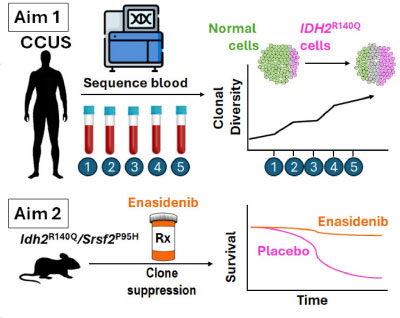
Researcher Profiles

Matthew Walter, M.D.
Washington University in St. Louis
2025 Funding Recipient
Genomics and Treatment of Clonal Cytopenias of Undetermined Significance
Discovery Research Grant 2025
PROJECT SUMMARY
Clonal Cytopenias of Undetermined Significance (CCUS) and Myelodysplastic Syndromes (MDS) are serious blood disorders. These disorders are caused by changes (mutations) in blood cells, leading to low counts of red blood cells, white blood cells, or platelets. Up to 95% of people with CCUS might develop MDS within 10 years.
 MDS is a condition where the body doesn’t make blood cells correctly, leading to badly shaped cells in the bone marrow. While some people with CCUS can have normal blood counts for years, others may need blood transfusions and develop MDS. Being able to find which CCUS patients are likely to get worse could help doctors start treatments earlier.
MDS is a condition where the body doesn’t make blood cells correctly, leading to badly shaped cells in the bone marrow. While some people with CCUS can have normal blood counts for years, others may need blood transfusions and develop MDS. Being able to find which CCUS patients are likely to get worse could help doctors start treatments earlier.
Both CCUS and MDS happen because of mutations in blood cells that stop them from growing and working properly. We can find all the mutations in CCUS and MDS blood cells by using whole genome sequencing, which looks at the entire DNA sequence. This helps us see how many cells are mutated and track changes over time.
We think that patients with increasing or changing mutated blood cells will become sicker compared to those with stable mutations.
Our research has two main goals:
Aim 1: To regularly check mutations in CCUS and MDS patient blood samples using whole genome sequencing and see if changes in mutations are linked to the disease getting worse.
Aim 2: To study how a patient’s mutated blood cells change after starting a treatment for the mutation. We will also see if mice with the same mutation live longer when they receive the treatment. In the end, tracking changes in mutations in CCUS patients’ blood could help personalize their disease risk and guide treatment choices.
